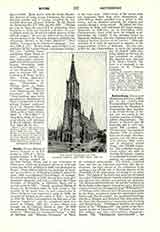

Rottenburg, Diocese of (ROTTENBURGENSIS), suffragan of the ecclesiastical Province of the Upper Rhine. It embraces the Kingdom of Würtemberg, three parishes in the Grand Duchy of Baden, and one parish in the Prussian territory of Hohen-zollern—Sigmaringen. The diocese is divided into 29 deaneries, and in 1911 contained 698 parishes, 19 Pfarrkuratien (incorporated churches with an independent care of souls), 164 chaplaincies, and 155 other pastoral charges; 1084 active and 75 pensioned secular clergy; and 728,000 Catholics. The cathedral chapter, which enjoys the right of electing the bishops, consists of a cathedral dean and vicar-general, six capitulars, and six cathedral prebendaries. The bishop, cathedral dean, and the six capitulars constitute also the ordinariate; the legal adviser of the ordinariate is the syndicus, a lay official who is likewise director of the chancellery of the ordinariate, consisting of six members. The rights of the State circa sacra are entrusted to a royal Catholic church council, which is composed of a director, two clerical, and several lay members. The diocesan institutions are: the priests’ seminary at Rottenburg, with a regent, viceregent, and a Repetent, or private tutor; the theological college “Wilhelmsstift” at Tubingen with a director and 7 Repetenten, supported by the State, and placed under the supervision of the bishop and church council; the gymnasial boarding-schools at Ehingen and Rottweil, also maintained by the State: the diocesan boys’ seminaries at Rottenburgand Mergentheim. Theological students are trained partly in the “Wilhelmsstift” and partly in the theological faculty of University of Tubingen, which has four ordinary and three extraordinary clerical professors. The “Theologische Quartalschrift”, the oldest theological periodical in Germany, is published by the professors of the theological faculty. Priests also act as instructors in the private boarding-schools at Ehingen, Ellwangen, and Rottweil, which are under the patronage of the bishop, as well as in the twenty-four State intermediate schools (Gymnasien, Realschulen, Lateinschulen etc.).
Despite every effort on the part of the Catholics, the male religious orders have not yet been readmitted into the Kingdom of Wurtemberg. In 1910 the following orders and congregations of women had establishments in the diocese: the Congregation of the Third Order of St. Francis, who have a motherhouse at Bonlanden, a boarding school, and two branches (116 sisters); the Sisters of St. Francis from Heiligenbronn, with a motherhouse and two branches (188 sisters), who conduct an institute for the rescue, education, and boarding of poor neglected girls, an institute for boys, and a children’s home; the School Sisters of Our Blessed Lady, with a motherhouse at Ravensburg and one branch (79 sisters); the Sisters of the Third Order of St. Francis, from Reute, who have 103 nursing establishments, schools for manual work, and schools for children (783 sisters); the School Sisters of the Order of St. Francis, who have a motherhouse at Siessen and 30 branches (373 sisters), and conduct several high schools for girls, and numerous public schools and schools for manual work; the Sisters of Mercy of St. Vincent de Paul, who have a motherhouse at Untermarchtal and 127 branches (1245 sisters), and, besides nursing the sick, conduct schools for children, and schools for manual training, homes for working women, boarding schools, and rescue institutions; the Sisters of the Holy Cross, from Strasburg, Alsace, who have one establishment with 13 sisters. There are also in the diocese 11 ecclesiastical boarding schools for poor children and one royal orphanage under religious direction. Of the numerous Catholic churches notable from the artistic standpoint may be mentioned: the Cathedral of St. Martin at Rottenburg, a three-naved Gothic basilica, which was completely renovated after the fire of 1644 (a new cathedral is being planned by the present bishop); the late-Roman Church of St. John at Gmund (thirteenth century); the Gothic parish church of Gmund (1351-1410); the church of the former Benedictine Monastery of Ellwangen, the largest Romanesque church in the country (1124); the parish church of Weingarten; the “Sankt Petersdom Wurttembergs”, erected in the Baroque style by the Benedictines (1738-53); the Gothic Church of Our Lady, Stuttgart (1879). Of the churches which were formerly Catholic, but which now are Protestant, the most important is the Gothic cathedral at Ulm (1377-1494), which has the highest church tower in the world (over 528 feet). Much frequented places of pilgrimage are Weingarten, Weggental, near Rottenburg; Reute, with the grave of Blessed Elizabeth Bona; the Schonberg, near Ellwangen, the Dreifaltigkeitsberg, near Spaichingen. Concerning the erection and beginnings of the diocese, see Ecclesiastical Province of the Upper Rhine; concerning its further history and the relations between the Catholic Church and the State, see Kingdom of Wurtemberg. It will be sufficient here to give a list of the bishops: Johann Baptist von Keller (1828-45), the first bishop; Joseph von Lipp (1848-69); Karl Joseph von Hefele (1869-93); Wilhelm von Reiser (1893-98); Franz Xaver von Linsenmann, d. September 21, 1898, before his consecration; Paul Wilhelm von Keppler (elected November 11? 1898j consecrated January 18, 1899).
JOSEPH LINS

